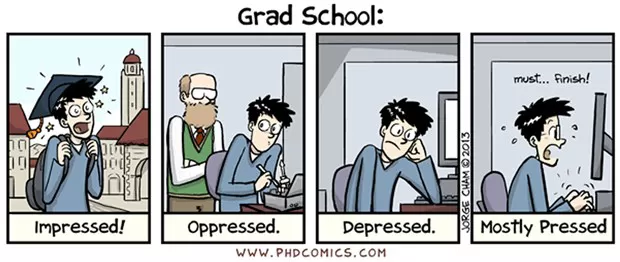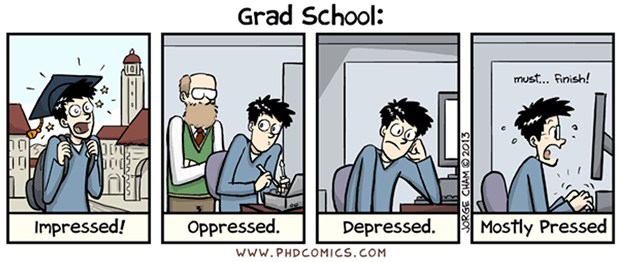
According to data from a report out of UC Berkeley, almost half of STEM PhDs are depressed. Additionally, these graduate students reported a lack of optimism in regards to their future career paths. These data are limited to one college campus; however, the study’s author, Galen Panger, believes these results would be replicated elsewhere. Panger viewed this study as a first step in expanding the conversation about mental health and wellness noting, “Graduate students have unique needs, and we need to expand the mental health conversation beyond mental illness and talk about everyone’s performance and everyone’s well-being.”
Why is graduate school a trigger for anxiety and depression? Graduate students often face many challenges in and out of the academic setting. In the lab, many report tense work environments with advisors as well as a pressure to produce groundbreaking results. Outside the lab, students face financial burdens and can feel isolated from family and friends who don’t quite understand the stressors of academic rigor. These factors can quickly add up, especially for students already vulnerable to mental health disorders.
 Wellness and self-care are extremely important during graduate studies. A recent keynote presentation at the 2015 GPP Retreat highlighted several points about the importance of paying attention to our own health and well-being. Stress is bound to be a part of life, but it is also important to recognize when stress becomes maladaptive for you. Individuals receive messages of stress through three main ways: body (physical sensations), mind (thoughts/images), and emotions (affect/feelings). Some physical symptoms of stress can include headaches, insomnia, low energy and frequent illness. Emotional symptoms can include feeling easily frustrated, overwhelmed, hopeless or helpless, as well as general moodiness. The cognitive symptoms of stress can include constant worry and racing thoughts and/or feeling the inability to focus or remember. Long-term stress can have many health consequences, such as depression and anxiety.
Life will never be completely stress-free, so how can you more effectively handle stress on a daily basis? Three quick and easy tips to try and incorporate daily include:
Wellness and self-care are extremely important during graduate studies. A recent keynote presentation at the 2015 GPP Retreat highlighted several points about the importance of paying attention to our own health and well-being. Stress is bound to be a part of life, but it is also important to recognize when stress becomes maladaptive for you. Individuals receive messages of stress through three main ways: body (physical sensations), mind (thoughts/images), and emotions (affect/feelings). Some physical symptoms of stress can include headaches, insomnia, low energy and frequent illness. Emotional symptoms can include feeling easily frustrated, overwhelmed, hopeless or helpless, as well as general moodiness. The cognitive symptoms of stress can include constant worry and racing thoughts and/or feeling the inability to focus or remember. Long-term stress can have many health consequences, such as depression and anxiety.
Life will never be completely stress-free, so how can you more effectively handle stress on a daily basis? Three quick and easy tips to try and incorporate daily include:
 Wellness and self-care are extremely important during graduate studies. A recent keynote presentation at the 2015 GPP Retreat highlighted several points about the importance of paying attention to our own health and well-being. Stress is bound to be a part of life, but it is also important to recognize when stress becomes maladaptive for you. Individuals receive messages of stress through three main ways: body (physical sensations), mind (thoughts/images), and emotions (affect/feelings). Some physical symptoms of stress can include headaches, insomnia, low energy and frequent illness. Emotional symptoms can include feeling easily frustrated, overwhelmed, hopeless or helpless, as well as general moodiness. The cognitive symptoms of stress can include constant worry and racing thoughts and/or feeling the inability to focus or remember. Long-term stress can have many health consequences, such as depression and anxiety.
Life will never be completely stress-free, so how can you more effectively handle stress on a daily basis? Three quick and easy tips to try and incorporate daily include:
Wellness and self-care are extremely important during graduate studies. A recent keynote presentation at the 2015 GPP Retreat highlighted several points about the importance of paying attention to our own health and well-being. Stress is bound to be a part of life, but it is also important to recognize when stress becomes maladaptive for you. Individuals receive messages of stress through three main ways: body (physical sensations), mind (thoughts/images), and emotions (affect/feelings). Some physical symptoms of stress can include headaches, insomnia, low energy and frequent illness. Emotional symptoms can include feeling easily frustrated, overwhelmed, hopeless or helpless, as well as general moodiness. The cognitive symptoms of stress can include constant worry and racing thoughts and/or feeling the inability to focus or remember. Long-term stress can have many health consequences, such as depression and anxiety.
Life will never be completely stress-free, so how can you more effectively handle stress on a daily basis? Three quick and easy tips to try and incorporate daily include:
- Stretching (even at your desk)
- Breathing (counting to 5 on your in breath, taking a pause for a moment, and then counting to 7 on your out breath)
- Getting up to move around (for several minutes every hour)
- Be proactive Don’t ignore your problems or be afraid to ask for help. Identify what isn’t working for you and make a plan to take control of the situation to improve it.
- Get connected Building strong, positive relationships will help provide the support you’ll need in times of stress. Continue to foster the relationships you have and, if needed, seek out new connections in your community.
- Take care of yourself Make time for yourself and nurture your mind, body and spirit in ways you see fit. Try the tips of stretching, breathing, exercise and mediation.




